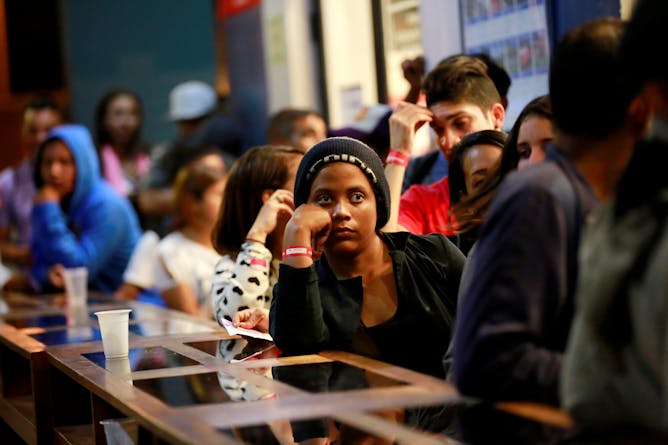|
|
|
Editor's note
|
|
The world watched in dismay as Brazil’s National Museum went up in flames over the weekend. Eighteen million artifacts are likely destroyed. Anthropologist Chip Colwell cautions that the Rio de Janeiro museum was not unique in the risks it faced. Whether made up of art, natural history specimens or other artifacts, “collections are never permanently safe,” he writes. “They require focused investments and proactive stewardship to ensure their
survival” – something those who hold the pursestrings don’t necessarily appreciate, even closer to home.
Venezuela is in economic collapse – and, over the past few years, about 7 percent of its population has fled the country. The majority have stayed in South America and say they someday plan to move back. Rebecca Hanson of the University of Florida describes the scale of this migrant crisis, which has sparked conflict in neighboring countries.
Fifty years ago this Friday, Led Zeppelin performed together for the first time in Denmark. Today they’re considered rock ‘n’ roll royalty, but the band’s spectacular rise was punctured by the many musicians who filed lawsuits claiming the band poached their riffs and lyrics. Had Led Zeppelin engaged in the benign “musical borrowing” that was a part of the era’s folk ethos? Or was something more sinister at play? To American University’s Aram Sinnreich, this is the dark paradox at the heart of the band’s legacy.
|
Maggie Villiger
Science + Technology Editor
|

|
|
Top stories
|

Brazil’s gutted National Museum now resembles an archaeological ruin itself.
AP Photo/Mario Lobao
Chip Colwell, University of Colorado Denver
It's a comforting falsehood that once an artifact joins a museum's collection, it's safe for eternity. Museums face many foes in the fight to preserve – a lack of funds might be the biggest.
|

Venezuelan migrants wait at the Binational Border Service Center of Peru.
REUTERS/Douglas Juarez
Rebecca Hanson, University of Florida
Fleeing economic collapse, around 2.3 million Venezuelans have left the country over the past few years.
|

Robert Plant, the lead singer of Led Zeppelin, performs in Hamburg, Germany in 1973.
Heinrich Klaffs
Aram Sinnreich, American University School of Communication
How can a band so slavishly derivative – and sometimes downright plagiaristic – be also considered radically innovative and influential?
|
Health + Medicine
|
-
Juan Carlos Izpisua Belmonte, University of California San Diego
Dangerous open wounds known as cutaneous ulcers are common in people with diabetes and bedsores. Now scientists have figured out how to reprogram the cells inside these wounds to heal themselves.
|
|
Politics + Society
|
-
Douglas W. Jones, University of Iowa
Ensuring the integrity of democratic elections from hackers and electronic tampering, and boosting public confidence in democracy, isn't very difficult, nor expensive.
-
Gideon Cohn-Postar, Northwestern University
While Donald Trump's election may seem to US voters to present unprecedented questions of legitimacy, such questions were first asked more than a century ago, in an election that turned on bicycles.
|
|
Economy + Business
|
-
Fabrizio Carmignani, Griffith University
Minister for Finance Mathias Cormann said corporate tax cuts in the US had led to 'stronger investment, stronger growth, a lower unemployment rate and higher wages'. Let's take a closer look.
|
|
Environment + Energy
|
-
Luciana Porfirio, CSIRO; David Newth, CSIRO; John Finnigan, CSIRO
Climate change will change the dynamic for major food exporters like China and the US.
|
|
Trending on site
|
-
Kim Haines-Eitzen, Cornell University
Early Christians were open to marriage for priests. It wasn't until the 12th century that celibacy became mandatory in the Catholic Church.
-
Jeffrey Kucik, University of Arizona
The president again threatened to drop out of the World Trade Organization if it doesn't 'shape up.' But a careful review of case filings show the US isn't treated any differently than its other members.
-
Matthew Motta, University of Pennsylvania; Steven Sylvester, Utah Valley University; Timothy Callaghan, Texas A&M University
Vaccines have long been considered safe, but many people still believe they are not. A new study shows that people who think they know more than medical experts are more likely to believe that vaccine are not safe.
|
|
| |
| |
| |
| |
| |
| |
|
|
|
|
|
|
|